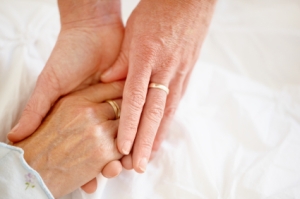Being with the dying

By Terre Mirsch
As a hospice and palliative care nurse, I have had the honor of being at the bedside of many during the dying process and at the time of death. It was a privilege to share in this journey, as a role model and mentor for the patients and families that I cared for. For caregivers, having access to a team of professionals who can serve as a guide and provide support during a time of doubt or apprehension is one of the greatest advantages of hospice care.
For many family caregivers, being at the bedside of a dying loved one is difficult. It is not uncommon to struggle with the idea of “being with” rather than to “doing for” those that we care about. We often pressure ourselves to do or say just the “right” thing when few caregivers have experience in knowing what to expect during the dying process, or have witnessed someone they love taking their last breath. Even those of us who know what to expect in the dying process sometimes struggle with knowing what to do or how to be when death impacts our own family or friends.
There is no right or wrong way to be with the dying. And while there is no need or ability to have all of the answers, the following guidelines may help you to feel more comfortable during this time:
- Understand that “being with” is more important than “doing for” during this time. Give yourself permission to be with your loved one at the bedside. The cooking, cleaning, yard work, and other chores can wait for another time.
- Touch lets your loved one know that you are present. You may touch your loved one if that is comfortable for you and for them. You may choose to lightly stroke their hands, feet, or back with moisturizing lotions, or to hold your loved one’s hand.
- Provide mouth care with toothettes, ice chips, or drops of water to moisten a dry mouth. Apply a nonpetroleum-based lip balm to moisten dry lips. Apply cool (or warm) compresses to the forehead.
- Talk to your loved one if you want to, as they may hear you even if they are not able to respond to your touch or your voice. You can share your favorite memories, read books or poems, pray, or play favorite music. However, do not feel pressured to talk if that is not comfortable for you, or if your loved one preferred quiet or reflective time over talk.
- If your loved one reports seeing or speaking with loved ones who have died, or is speaking about symbols such as butterflies, lights, going on a trip, or going home, allow them to talk if these things are not disturbing to them. This experience is referred to as nearing death awareness and it is usually best not to try to talk them out of what they believe they see.
- Avoid talking “about” your loved one as if they are not present. Include them as part of the conversation, even if they are not participating or are not responsive.
- Focus on the present—the here and now—and be open to whatever comes. Your presence is a gift to your loved one.
- Saying “goodbye” may be an important part of closure for you and your loved one. Leave nothing unsaid that might bring you and your loved one peace and comfort.
- Give yourself permission to take a break. It is “OK” for your loved one to have quiet or alone time as well.
Being with our loved one during the dying process can be a time when we have more questions than answers, more uncertainty than conviction, and more vulnerability than strength. But by being present in whatever way we are able, it can also be a sacred time of wonder, beauty, and love.



Terre, this is beautiful. I appreciate the fact that you have gone through this many times and can talk from more than one experience. In my very limited experience there is something that feels so right about “being” during this time. My strongest experience, being with my partner when she died, was that she was perfectly fine in the process of moving on. And I have to call it a process because it was something that, in her case, came in like the tide until she was no more. I was not in a position to suppress the tide; I could only be a witness to nature working its magic and be there with her.
Thank you, Ira, for your response and comments. Dying is, indeed, a process that often begins long before we recognize what is actually occurring. Once the stage of what is referred to as ‘active dying’ begins, you are correct in your impression that we are not in a position to suppress the tide- or to stop or slow the process. I’ll be sure to talk about the dying process in future posts. When we know what to expect during the process, our fears and anxieties often dissipate and we are able to be more present in the moment. I am glad that you were able to be present with K during her final hours and days and that your memory of this time brings you strength and comfort.
As you’ve mentioned, some people have a difficult time in that situation but I love your suggestion of just “being.” I’m certain that the dying loved one is aware of the love and compassion that comes forth from even the smallest of ministrations to the body.
Recently, my sister-in-law died at the age of 69 from early-onset Alzheimer’s. The family was at her bedside throughout the morning and only one son had yet to arrive. My brother told his wife that the son would be here soon. Truly, my sister-in-law was barely breathing but she held on until her youngest son got there. We all left the room to give him privacy with his mother and a minute later, after he had said his goodbye to her, she passed on. We all returned to the room and a caregiver that was present said, “A mother’s love, expressed right to the end.” The fact that my sister-in-law held on – certainly it was a struggle to do so – until her son arrived was a gift that he will always cherish. There is beauty in death – because that act perfectly illustrated the beauty of their relationship.
Thank you, Irene, for sharing your experiences. Often, the idea of “being” rather than “doing” is very foreign to us in our task driven society. We spend so much of our life completing “To Do” lists and trying to cram as much as we can into a 24 hour day that slowing down and simply being present may feel uncomfortable. It is actually easier to do something than it is to sit quietly in stillness and contemplation. After many years of working with the dying, I find the dying process and, sometimes, the timing of the moment of death to be a time of wonder and awe. I’ve witnessed the holding on and waiting for loved ones to arrive, as you described. I’ve also witnessed bedside vigils where the dying let go at the very moment that their loved one takes a break, even if it was for a brief time. I’ve often thought that it may be too hard for some to let go when those they love so deeply are with them. The process is different for everybody and there is no right or wrong way to do this. Ultimately, we need to trust that we and our loved ones know our own right way. Thank you again for your response, and thank you for following Caring with Confidence.
hI i AM rose and my husband died april282012 hospice nurse came in and i never intended for them to give my husband more morphine or what ever they gave him it took him sooner then we all could handle he was corrent and talking one min and i left the room and he was dying my daughter never got to say good bye the hospice nurse should of told me what he was doing and not take it upon himself to make my husband go the way he did because we never had the chance to talk that night.He died so fast and I never imagine this was going to happen or I would not of called them .the male nurse said he could tell by my voice i wanted him to come,Yes I was panicked because my husband took another of many falls and my neighbor came in and we helped him into bed he was ok and my neighbor talked to him as well the next day he was gone and my neighbor was shocked why did he die so fast .well a you know i can not say because i was not in the room and never had the chance to talk to the nurse he will not anwer my phone calls to tell me what joe last words were and what else he might of said.I am not out to cause trouble jjust want to know what happened and what my husband last words and maybe he told the nurse something to give me the comfort i never have or will rver have now rose deam ambler,pa
Hello Rose,
Thank you for reaching out for help and guidance regarding the events of your husband’s death. While we are unfamiliar with the circumstances of your husband’s medical condition and care, I can certainly respond based on my own experiences both professionally and personally. I know that it can be very difficult when the loss of a loved one occurs sooner than we expect. Even when we know that time is limited, the last days, hours, or moments of life sometimes come quickly and cannot be predicted. Signs of gradual decline such as frequent falls may suddenly lead to a rapid decline and change in condition as body systems shut down. While not common, sometimes an unanticipated medical event occurs that leads to sudden death.
It is a common misconception that morphine or other pain relievers hasten the dying process. This misconception stems from the fact that morphine, a moderate potency narcotic medication, is often used in low doses to control symptoms associated with the dying process. A low dose of morphine is typically the best medication for the control of pain or shortness of breath during the final stages of life. It is also effective in alleviating anxiety and restlessness. While morphine does not hasten the dying process, it does help to ensure that loved ones experience a peaceful and comfortable death.
I encourage you to reach out to the hospice that cared for your husband. They will be able to talk with you further about the specifics of your husband’s condition, what medications he received, and for what reason. Their bereavement counselors can also provide additional support during this difficult time.
Thank you for following Caring with Confidence. I hope that we can continue to be of support to you during your time of grief and loss.
Sincerely,
Terre